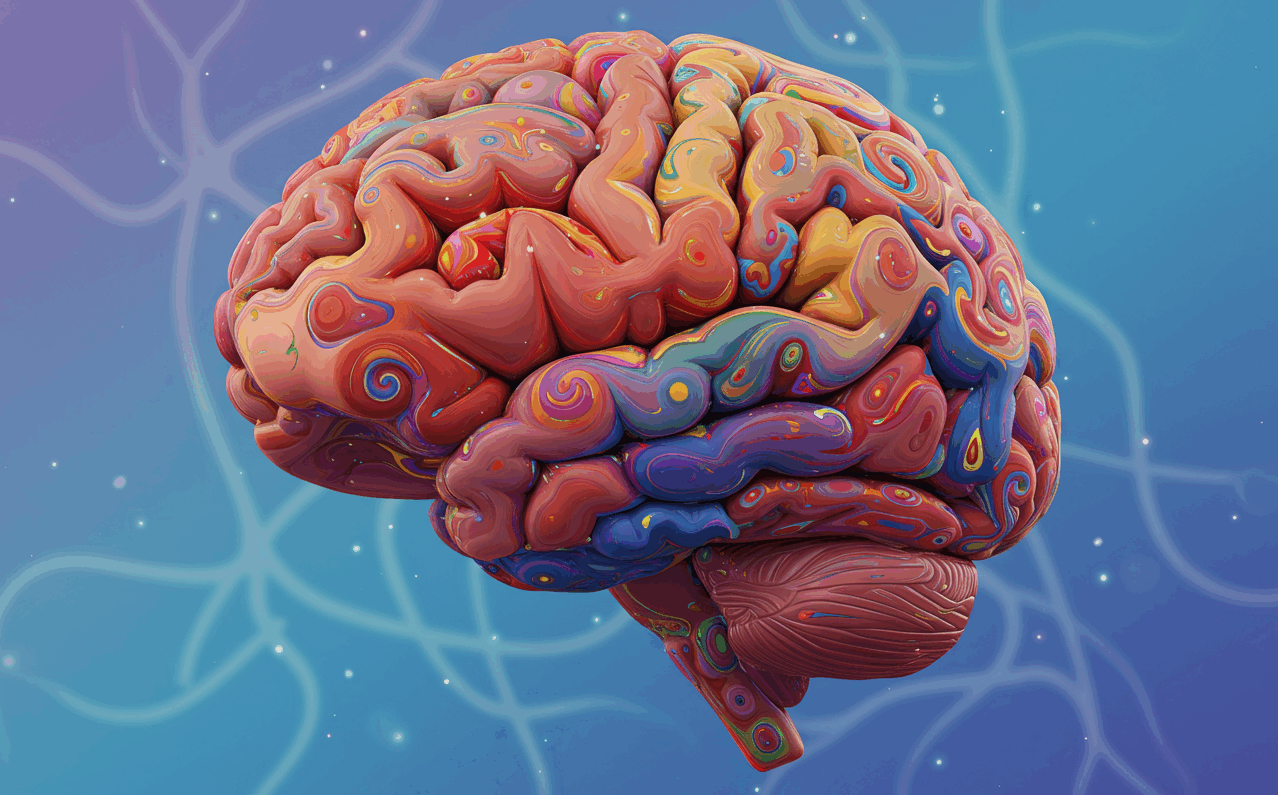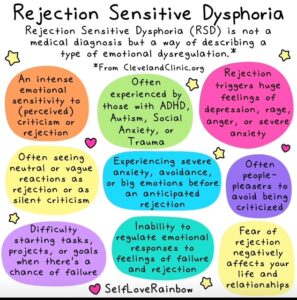What is RSD? Well, it’s all the things shown in this picture and it’s a real thing that goes along with ADHD.
Many people might say that we all have fear of rejection and that this is nothing special etc., but for us it is much more than just fear of rejection and I felt that I needed to go into more detail about this.
For me, rejection and a certain type of criticism (mainly the non-empathetic, judgmental, personal type) results in severe pain, both physical and emotional. For me, it is also a major contributor to a lot of trauma, depression and anxiety, as well as a suicide attempt and two hospitalizations. It has significantly changed who I am and robbed me of living the life I deserve.
What exactly does that mean? Well, I avoided all sports and competitive situations. I wouldn’t participate in school competitions, team sports, or apply for jobs because I felt shame and fear of rejection. Worse, I feared that I would be given reasons that would send me into a tailspin of self-loathing and doubt. I felt that I wasn’t as intelligent as others, because no intelligent person would make some of the choices I made or engage in some of the arguments I made.
All my life I have felt that there was something seriously wrong with me. As a child, I thought I was adopted; it literally felt like I was not even from the same planet. The way I saw the world and the people in it was very different from everyone else. Of course, I was often wrong for what I thought, how I behaved, or how I spoke.
Here is an example that would repeat itself for years. I had/have an unusual ability to read people. I would know when someone was lying, when someone was feeling insecure even though they were projecting confidence, and I would often “know” who a person really was regardless of what they portrayed on the outside. I attribute this ability to a difficult childhood because my survival/well-being depended on accurately reading tone of voice, body language and facial expressions, as well as being able to predict what the person would do next. This ability comes so naturally to me that it never occurred to me that others could not do the same.
What does this mean? Well, I could tell in a job interview who was telling the truth and who was a potential future HR problem. In one company, this was so well known that managers would ask me to interview their candidates because my assessment of people was so accurate.
I remember years ago an executive asking me why I didn’t tell him that a person he had selected was going to be a problem, and as I explained it to him, it finally dawned on me that other people really didn’t see what I saw. The problem was that I thought it was because there was something wrong with ME! I felt that if everyone else was believing, experiencing, and seeing certain things that I was not, then the problem must be with me because I was the weird one. The best therapist I had when I was in my 20’s explained to me that “normal” is simply a matter of numbers/statistics. What is considered normal is just what the majority does, which definitely meant that I was not normal and therefore had no chance of getting that promotion, winning that race, getting that job, etc. It was also really scary because I often believed that the majority was anything but normal.
I was diagnosed with Fibromyalgia when I was 23. When I was diagnosed with ADHD at age 54 and learned about RSD, I couldn’t help but wonder if fibromyalgia wasn’t just a physical manifestation of my inner turmoil, anxiety, fear and stress that comes from endless years of masking, censoring and trying to hide who I am.
The last thing I want to add here is that RSD is not the same as fear of failure. Just like “Doesn’t everyone have ADHD these days?” it is just as toxic to tell me that you definitely understand because you also suffer from imposter syndrome or fear of failure. ADHD and RSD are not things I can overcome with meditation or cognitive behavioral therapy (although they do help). They are not the same as feeling insecure and working on my self-esteem. No, in order for me to actually function and not become agoraphobic or live on daily doses of Xanax, I need to take medications that are specifically designed to add the two hormones that my brain does not produce enough of: dopamine and norepinephrine.
I hope there will be more education when it comes to ADHD, autism, hypersensitivity, etc., but until then, the world remains an often scary and treacherous place that is not designed to help us succeed.

